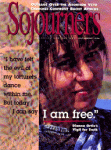The Daher family has cultivated olives, fruit, and nuts on their land outside Bethlehem for almost 100 years. The Israeli government diverted the water supply for new Israeli settlements. The land lay fallow. But their dreams of farming it were still alive.
Recently Israeli settlers claimed that land, citing the scriptures as evidence that it was given to them by God. The Dahers turned to their congregation, the Evangelical Lutheran Christmas Church in Bethlehem, for help.
From this very personal experience of his parishioners and from his own life Mitri Raheb writes I Am a Palestinian Christian. In his book he develops a local, Palestinian-Christian theology.
Raheb writes, “I believe that a contextual Palestinian theology is nothing else than an attempt to develop a local theology that is positive, relevant, and important for the future of the Holy Land. It is an alternative both to escaping into religious fundamentalism and to discarding religion for secularism.”
He describes how his people live under the oppression of another people of “The Book” who see the land as given to them by God. This land, according to Raheb, also “belongs” to the Palestinians. But they are not in power.
Even though the peace accord was signed in 1993 with much fanfare and hope, the many tragic events of this last year underscore the fragile nature of peace. All sides need to work for justice and an equitable distribution of land.
Buses full of foreign tourists can travel freely between Bethlehem and Jerusalem. Raheb’s people cannot. Tens of thousands visit the Church of the Nativity and take pictures of its stones. Raheb reminds us of the living stones in his congregation.
He describes the irony that Israel, once miraculously delivered from Pharaoh’s bondage, has now assumed the role of Pharaoh. What is the role of the church, in the face of this oppression, but to speak the truth and to resist with word and deed the oppressor? And what if the Western church has mostly sided with Israel and become Pharaoh?
Raheb fills this brief book with personal stories, congregational stories, biblical exegesis, sociopolitical analysis, and an admonition to hope. He provides a solid introduction to the history and religious dynamics of the Palestinian-Christian situation even as it offers a brief contextual Christian theology. He invites us to enter the story with critical and faithful eyes and hearts.
Review of I Am a Palestinian Christian. By Mitri Raheb (Fortress Press, 1995).
JEFFREY LOUDEN is pastor of St. Matthew’s Lutheran Church in Madison, Wisconsin.

Got something to say about what you're reading? We value your feedback!